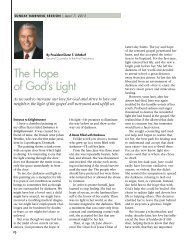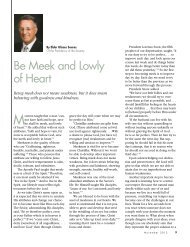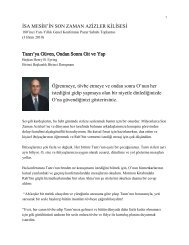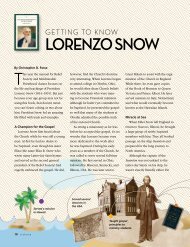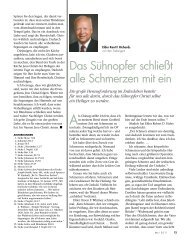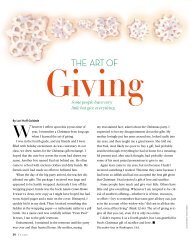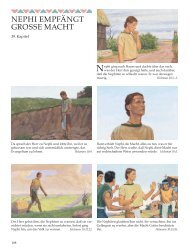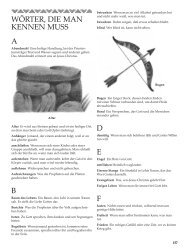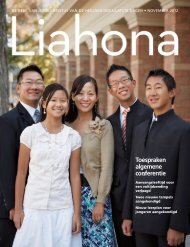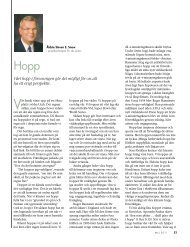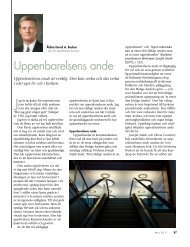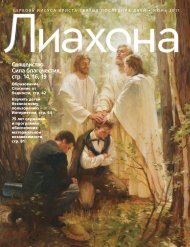April 2005 Ensign - The Church of Jesus Christ of Latter-day Saints
April 2005 Ensign - The Church of Jesus Christ of Latter-day Saints
April 2005 Ensign - The Church of Jesus Christ of Latter-day Saints
Create successful ePaper yourself
Turn your PDF publications into a flip-book with our unique Google optimized e-Paper software.
words, rejoicing and prayer” (vv. 9–10, 12–14).<br />
It seems self-evident that we can hardly become<br />
“unspotted from the world” if, instead <strong>of</strong> participating<br />
in the activities described above, we spend the Sabbath<br />
“finding [our] own pleasure, [and] speaking [our] own<br />
words” (Isaiah 58:13).<br />
Our Heavenly Father and His Son, <strong>Jesus</strong> <strong>Christ</strong>, love<br />
us. <strong>The</strong>y give us commandments because <strong>The</strong>y do “that<br />
which is good among the children <strong>of</strong> men” (2 Nephi<br />
26:33). Our love for <strong>The</strong>m can be measured by our willingness<br />
to obey, as demonstrated by our thoughts, words, and<br />
deeds. When we are obedient, our understanding <strong>of</strong> the<br />
purposes <strong>of</strong> God increases, as does our happiness. As our<br />
understanding and happiness increase, our capacity to<br />
love our Heavenly Father and our Savior also grows.<br />
As we read in the Doctrine and Covenants, on Sun<strong>day</strong><br />
we are commanded to go to “the house <strong>of</strong> prayer,” or<br />
church, to participate in the sacrament and pay our devotions<br />
to God. During the sacramental service, as we sing<br />
the hymns and listen to the sacramental prayers, we are<br />
reminded <strong>of</strong> the life and Atonement <strong>of</strong> <strong>Jesus</strong> <strong>Christ</strong>. When<br />
<strong>of</strong>fering our sacrifice and oblations, we press sanctified<br />
symbols to our lips in renewing our baptismal covenants.<br />
Yet although the central part <strong>of</strong> our<br />
Sabbath worship should occur during<br />
the sacrament itself, it should<br />
not be limited to this. In a footnote<br />
to Doctrine and Covenants 59:12,<br />
the term oblations is defined as<br />
“<strong>of</strong>ferings, whether <strong>of</strong> time, talents,<br />
or means, in service <strong>of</strong> God and<br />
fellowman.” We should continue to<br />
“<strong>of</strong>fer [our] oblations” through silent<br />
and vocal prayers throughout the<br />
Sabbath, as well as through service<br />
to others—which is service to God<br />
(see Mosiah 2:17).<br />
Confessing sins to God, and also<br />
to the bishop or branch president<br />
when the nature <strong>of</strong> the sin requires<br />
HELPS FOR HOME EVENING<br />
1. Draw and show a picture <strong>of</strong> a face with<br />
spots on it. Or you could attach some small<br />
paper circles to a family member’s face. Read<br />
the first phrase <strong>of</strong> Doctrine and Covenants 59:9<br />
and ask family members to find in verses 9–14<br />
ways to remove the “spots” <strong>of</strong> the world.<br />
Discuss how your family observes the Sabbath<br />
using ideas mentioned in this article.<br />
2. Identify in this article principles dealing<br />
with appropriate labor and rest on the Sabbath.<br />
Share an experience <strong>of</strong> how proper Sabbath<br />
observance has blessed your life.<br />
it, is the desire<br />
<strong>of</strong> the faith-filled, repentant soul. Confession opens the<br />
way for forgiveness and cleansing. What greater joy can we<br />
experience in mortality than to know we are clean?<br />
Preparing our food “with singleness <strong>of</strong> heart” means,<br />
in part, that we prepare our Sun<strong>day</strong> meals ourselves<br />
rather than purchasing them from commercial establishments.<br />
It suggests that such preparation should not be<br />
laborious and that we should strive to maintain feelings<br />
<strong>of</strong> worship and devotion. It also suggests that hearts should<br />
be single to the glory <strong>of</strong> God, just as our eye is to be single<br />
to His glory (see D&C 88:67–68). After all, the most important<br />
type <strong>of</strong> feasting on the Sabbath is spiritual feasting,<br />
which on some <strong>day</strong>s may be accompanied by fasting.<br />
Interestingly, the command to “rest from [our] labors”<br />
is placed between the phrases “<strong>of</strong>fer up thy sacraments”<br />
and “pay thy devotions.” For me, this signifies that resting<br />
is essential but that worship precedes and follows the<br />
resting. As important as physical renewal is, resting alone<br />
does not meet the demands <strong>of</strong><br />
the law <strong>of</strong> the Sabbath.<br />
I was taught in my home that<br />
the Sabbath was not intended<br />
for any labor except spiritual<br />
labor. <strong>The</strong> Lord promises that<br />
those who do “the works <strong>of</strong><br />
righteousness shall receive . . .<br />
peace in this world, and eternal<br />
life in the world to come” (D&C<br />
59:23). One “work <strong>of</strong> righteousness”<br />
is to keep the Sabbath <strong>day</strong><br />
holy. I know the Lord’s promises<br />
are real. Honoring the Sabbath<br />
brings us closer to the Lord and<br />
enables us to feel His love more<br />
abundantly. ■<br />
ENSIGN APRIL <strong>2005</strong> 67



